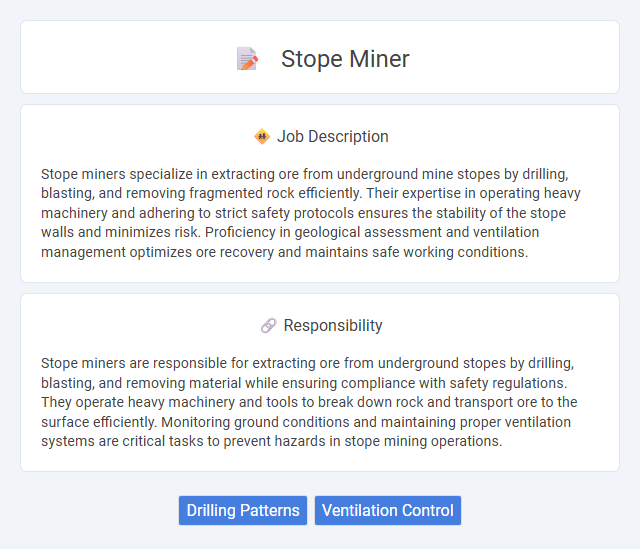
Stope miners specialize in extracting ore from underground mine stopes by drilling, blasting, and removing fragmented rock efficiently. Their expertise in operating heavy machinery and adhering to strict safety protocols ensures the stability of the stope walls and minimizes risk. Proficiency in geological assessment and ventilation management optimizes ore recovery and maintains safe working conditions.
Individuals with strong physical endurance and resilience are likely to be suitable for a Stope Miner job, as the role often involves working in confined, underground environments with challenging conditions. People prone to claustrophobia, respiratory issues, or poor physical stamina may find this occupation difficult to manage. Safety-conscious candidates who can adhere to strict protocols and handle physically demanding tasks have a higher probability of thriving in this position.
Qualification
Stope Miner positions require candidates to have a minimum of a high school diploma or equivalent, with specialized training in underground mining techniques preferred. Proven experience in operating mining equipment, knowledge of safety regulations, and the ability to work in physically demanding environments are essential qualifications. Certifications such as a mine safety card and first aid training enhance employability in this role.
Responsibility
Stope miners are responsible for extracting ore from underground stopes by drilling, blasting, and removing material while ensuring compliance with safety regulations. They operate heavy machinery and tools to break down rock and transport ore to the surface efficiently. Monitoring ground conditions and maintaining proper ventilation systems are critical tasks to prevent hazards in stope mining operations.
Benefit
Working as a stope miner likely offers strong financial benefits due to competitive wages and overtime opportunities typical in the mining industry. The role may provide job stability, especially in regions with active mining operations, where demand for skilled labor remains steady. Workers might also access health and safety training along with career advancement prospects within mining companies.
Challenge
The role of a Stope Miner likely involves navigating complex underground environments, which presents significant safety and operational challenges. It probably requires precise execution of mining techniques under unpredictable conditions to ensure both productivity and worker safety. The job may demand constant adaptation to evolving geological factors and equipment limitations, making it a highly demanding occupation.
Career Advancement
Stope Miners operate in underground mining environments, specializing in extracting ore from stopes with precision and safety, mastering technical skills that are highly valued in the mining industry. Career advancement opportunities include progressing to supervisory roles such as Shift Boss or Mine Manager, where leadership and operational planning become key responsibilities. Continuous training in mining technology and safety protocols enhances prospects for higher-paying positions and specialized roles like Mining Engineer or Safety Officer.
Key Terms
Drilling Patterns
Stope miners utilize precise drilling patterns to optimize ore extraction while maintaining mine stability and safety. The selection of drilling patterns, such as rectangular, fan, or staggered, directly impacts fragmentation efficiency, muck removal, and overall productivity in underground stoping operations. Advanced software and geological data guide the design of these patterns to enhance blast control and minimize dilution in mineral recovery.
Ventilation Control
Stope miners play a critical role in underground mining by excavating ore while maintaining structural integrity and safety. Effective ventilation control is essential in this position to manage air quality, remove hazardous gases, and ensure a continuous supply of fresh air to prevent toxic buildup. Proper implementation of ventilation systems enhances worker safety, operational efficiency, and compliance with mining regulations.
 kuljobs.com
kuljobs.com